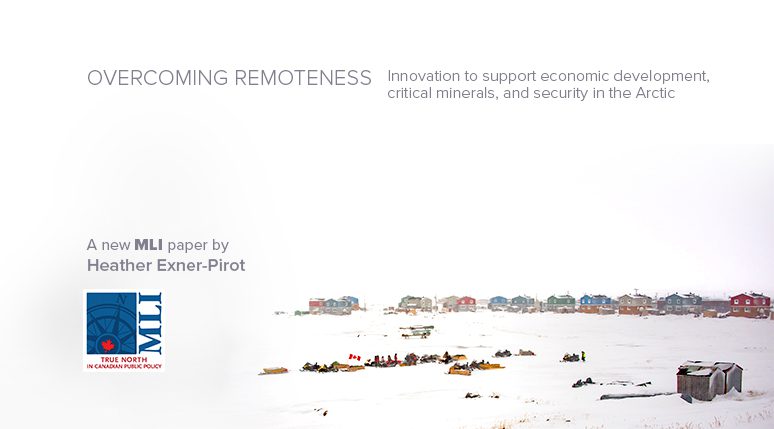By Heather Exner-Pirot
July 11, 2023
Executive Summary
Remoteness has a dramatic effect on human and economic development. In remote locales, such as the North American Arctic, costs are much higher for services, goods, and infrastructure than in the rest of North America, yet the needs are greater to cope with the distances and challenging environment.
However, current geopolitical and economic circumstances may prompt change. The Arctic has long been described as a bonanza of resources, especially oil, gas, and minerals. Yet currently in Canada’s territories there is almost no oil and gas production. Despite the fact that mining production accounts for 99 percent of the territories’ exports by value, it is still a relatively small portion of Canada’s mining production and almost none of it is in critical minerals. Rather, the vast majority of production has been concentrated in the more easily transportable diamonds, gold, and silver, and, in one case due to proximity to tidewater, iron.
The demands for energy transition and the needs of the sectors supplying it require far greater mining activity as we move from a hydrocarbon-intensive energy system to a mineral-intensive one. At the same time, the world is seeking security as it aims to reduce its resource dependency on adversaries such as China and Russia. However, despite the growing importance of friendly and enhanced supplies of critical minerals, and the understanding that the North American Arctic holds significant quantities of these, the region remains an expensive and challenging place in which to mine.
Although many articles on the Arctic claim that it is becoming more accessible to develop resources there due to climate change, in reality this is not the case. Changes in the climate do not counterbalance the other, more prohibitive, challenges that resource development faces in remote areas, not least from climate change itself.
The challenges associated with resource development in the Arctic broadly mirror those that remote communities face more generally, and include lack of infrastructure; extreme weather conditions that make outdoor work difficult and expensive; sparsity of population, which makes it difficult to attract and retain qualified labour; and environmental concerns about disturbance to water, wildlife, and plant life. In fact, while there is a growing political recognition of the importance of critical minerals from the Arctic thereis still limited support from the public for an expansion of mining activities. If anything, support has been diminishing.
Thus, new strategies are needed if development is to grow in the Arctic. Fortunately, a number of transformative technologies are on the horizon. They include small modular reactors (SMRs) which could supply energy (both heat and power) to remote locations, airships (lighter-than-air, low-environmental-impact aircraft that operate under their own power) that could supply cargo transportation to and from remote regions, and fibre networks that could give remote locations good communications and through which mines could implement numerous technological upgrades including autonomous drilling, driverless haul trucks, drones for surveying and safety, wearable technologies, and predictive maintenance.
These transformative technologies would benefit not just residents of remote regions and mining operations in the area, but the military. The need to defend North America and deter Russia – and China – from attacking in the first place depends on a strong military presence in the Arctic. This is where SMRs, airships, and fibre optic lines can serve a dual purpose (civilian and military), and perhaps the military could be secured as an anchor customer.
The combination of the desired energy transition and the need to secure critical minerals from friendly sources may finally be the impetus needed to shake the region out of its current development paradigm. Fortunately, technologies are now emerging that have the potential to address the challenges that remoteness imposes on energy, transportation, and connectivity. These have the potential to not only improve the quality of life for the region’s inhabitants, but allow more economically and environmentally responsible development of critical minerals.







